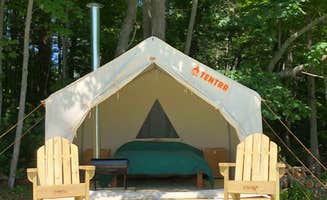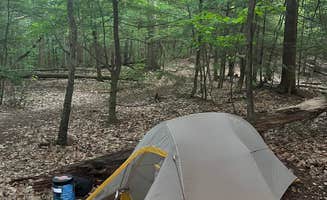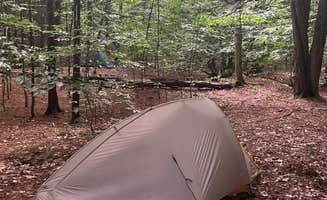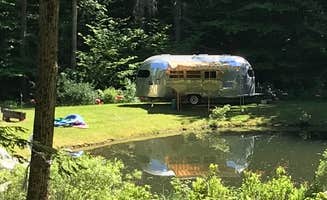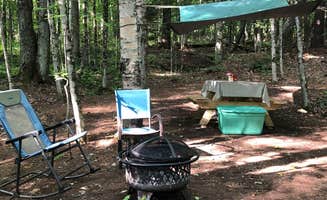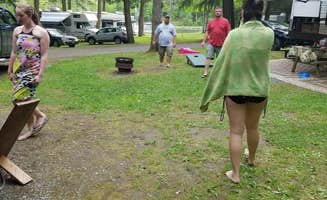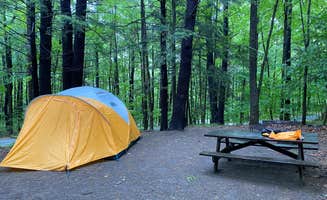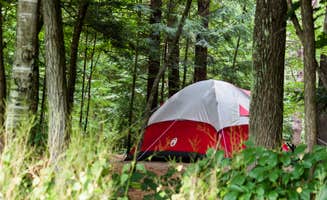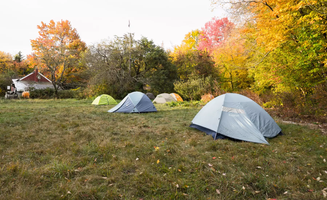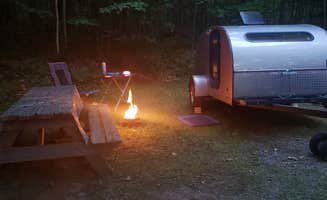Lebanon, New Hampshire camping spots range in elevation from around 400 feet in the river valley to nearly 3,000 feet on nearby Mount Ascutney. The Connecticut River forms a natural boundary between New Hampshire and Vermont, creating opportunities for waterside camping and paddling activities. Summer temperatures typically range from 50-85°F, with July and August being the warmest months for camping.
What to Do
Paddle the Connecticut River: Access the river at Wilgus State Park Campground, located 15 miles south of Lebanon. "This was a good little spot for a good night's sleep... Spots aren't very big but big enough to squeeze in two tents," notes Erik C. The park offers canoe and kayak rentals with shuttle service available on select days.
Mountain bike nearby trails: Several trail networks exist within 30 minutes of Lebanon. "The state park had lots of tent camping around in spaces with decent privacy," reports Justin P. about Winturri Backcountry Shelter, which provides access to the Appalachian Trail and surrounding trails.
Visit local attractions: Drive 15 minutes to Harpoon Brewery from many camping locations. "The town of Woodstock is a short drive west, and Killington Resort is a bit west of that. Killington offers summer mountain biking, zip lines, adventure climbs and roller coasters," writes Chris A. from Quechee State Park.
What Campers Like
Spacious campsites: Many campgrounds offer larger sites for privacy. At Mount Ascutney State Park Campground, "sites are very well maintained and have decent spacing between sites. The mountain biking trails are awesome and the hiking is fantastic!" according to Dana M.
Clean facilities: Campers consistently note well-maintained bathroom facilities. "The bathrooms were cleaner than mine at home. Nostalgic feel with playground, pool, and rec hall," shares Ashley O. about Rest N Nest Campground, which is located about 20 minutes from Lebanon.
Ranger-led activities: Some parks offer organized programs. "Rangers also run fun programs for children- my children churned butter and made popcorn over the campfire one night, and made tie dyed T-shirts the next (for no fee)," reports Jen B. about activities at Quechee State Park.
What You Should Know
Road noise considerations: Highway proximity affects some camping locations. "The cons: The road nearby is noisy. Because of its location, you can hear both the local highway and I91. If being in the quiet wilderness is important to you, than this campground might not work out," notes a reviewer about Wilgus State Park.
Weather variability: Temperatures can fluctuate significantly in spring and fall. At Quechee-Pine Valley KOA, "The park is a large park that is terraced since it is in a pretty hilly area," explains Nancy W., which can affect drainage during rain.
Reservation requirements: Many campgrounds require two-night minimum stays during peak season. "I had to book two nights because of the seasonal policy (requires two nights reservation during summer)," mentions Erik C. about Wilgus State Park.
Tips for Camping with Families
Look for camps with kid-specific activities: Some campgrounds organize regular family events. "Wilgus state park has amazing campsites, very friendly staff, and great access to the Connecticut River... We loved walking the trail behind the campsites along the river to the beautiful vista views with a group with young kids," shares Kaileigh K.
Consider campgrounds with swimming options: Several sites offer water recreation. "There is a great local pond for swimming that had dive docks, diving boards and lifeguards on duty that was less than 10 minutes away," notes Kaileigh K. about options near Wilgus State Park.
Check for playground availability: Some campgrounds include play areas. "This campground was beautiful and very quiet even though it was full. Campsites are all large and flat, lean to's also have ample space for tents and the cabin sites are perfect," adds Kaileigh about the family-friendly setup at Wilgus.
Tips from RVers
Site selection matters: Consider your specific RV needs when booking. At Storrs Pond Recreation Area, "Only complaint is the site is set up 'backwards' - the electric hookups are on door side of rv and the picnic table/main area of site is on non door side," reports Amy G.
Leveling challenges: Some campgrounds have uneven terrain. "It looks like the state has spread out RCA on the sites, which probably could have been spread out better and made more level. Also tough to drive a stake into," notes Chris A. about Quechee State Park.
Hookup availability varies: Check specific amenities before booking. "There are no hookups but they do have a dump station if you are in an RV. They also have several lean-tos that you can rent," explains Jan B. about facilities at Quechee State Park.


